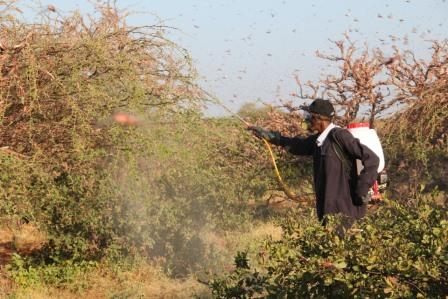The Agrochemical Association of Kenya has assured Kenyans that the Fenitrothion chemical used to fight locusts, army worms among others was safe.
The Association’s CEO Eric Kimungunyi said that many Non-Governmental Organizations (NGOs) are pushing for Fenitrothion to be banned in Kenya with the claim that these pesticide causes cancer and affecting the reproduction health and have been banned in Europe.
Kimungunyi addressing a press briefing in a Nairobi hotel on Thursday said that Kenya has long-standing and best-in-class legislation covering the regulation of pesticides, which is set out in Pest Control Products Act (PCPA) and which is applied by the Pest Control Product Board (PCPB).
He also stated that PCPB staffed by many excellent scientists, legislation and regulatory structures have only allowed pesticides to be approved for use in Kenya which have been thoroughly subjected to the most international testing and approved by leading testing regimes like the US and Australia.

“We do not venture into accepting pesticides for use that are deemed or classified as a risk to health or the environment elsewhere,” stated the CEO.
He explained that Europe alone has changed its rules on all pesticides and it has moved to a regime that is called hazard assessment, whereas the rest of the world applies risk management.
“The decisions by Europe to reject all chemicals expect safely consumable once has been controversial in Europe and globally and is a dispute playing out elsewhere,” said the CEO.
Kimungunyi claimed that the NGOs have petitioned parliament to ignore local scientists, the US approvals, and end local approval regime which approves pesticides only for uses that do not harm human health or environment, in order to adopt the European regime instead.
“They do not care for our legislative process or raising a bill of Law for all authorities to assess. They do not care for the impact assessment that are obligatory for our legislation, and do not care of the impact of such a move,” said the CEO.
Farmers and scientists called on government to prevent food catastrophe by upholding pest control law and not ban the pesticides being used to curb locusts and fall Army Warm which might lead to crop devastation and could wipe out the country’s food baskets within months.
Currently, through the Ministry of Agriculture in consultation with Food and Agriculture Organization (FAO), the Government is fighting the locusts with pesticides such as Fenitrothion, which is in the petitioners proposed list of pesticides to be banned.
By Alex Methu and Joseph Ng’ang’a





